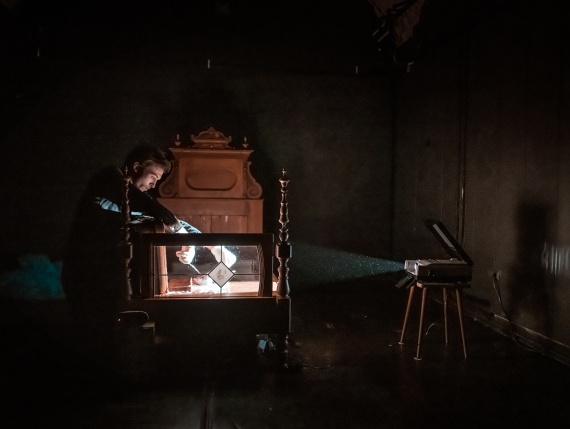Messy Room (Festival LUTKE)
Description
In every house, there is a place without a special purpose. It is where we put away what we no longer need, but are not yet ready to admit that to ourselves. It is a space (be it a room, a drawer or just a box) where we leave memories that we don't trust to stay in our minds. They seem too fragile. Eternally elusive, but so important. Who are we without them? And who are we with them?
Memory is always the property of the one who remembers. It does not exist for others, but it creates him or her. Memory is active: it is not a museum artefact, but a parallel reality to which we can return again and again. At the same time, however, memory is also deceptive: it creates its own course of events, it adds and emphasises, it subtracts and obliterates. Memory is real, even if it is not in line with reality. It does not lie, but at the same time it does not necessarily tell the truth. It lies somewhere between reality and delusion. It exalts and demeans the individual, it exposes the extremes, it leaves out the banal. Memory is episodic, fragmentary and incomplete.
Memory is a messy room through which we have to wade to get to our origin, to ourselves. Because in every house there is a room without a special purpose.
The performance Messy Room depicts memories through the medium of object theatre, using and animating everyday objects that evoke and manifest nostalgic associations. The object as one of the possible carriers of memory, or at least its trigger, opens up a collage of glimpses into the author's life. Despite their (auto-)fictional narrative, it is precisely because of the universal communicative power of everyday objects that the performance structure becomes a testing ground in which each of us can draw our own threads of memory.
Klemen Kovačič (1998) graduated in drama at the Academy of Theatre, Radio, Film and Television (AGRFT) in 2022 with the role of Gregor in his graduation production of Dane Zajc's play Jagababa directed by Živa Bizovičar. During his studies, he worked with various theatre institutions and to date has acted in projects of the Ljubljana Puppet Theatre, Ljubljana City Theatre, SNG Nova Gorica, Mladinsko Theatre, Glej Theatre, and more. He has collaborated with renowned Slovenian and foreign directors such as Dragan Živadinov, Diego de Brea, Matija Solce, Mare Bulc, Bojana Lazić and Žiga Divjak. He is a co-founding member of the collective Počemučka, within which he co-created, among other things, a performance called Underconstruction (Theatre Glej), which received a special jury prize at the 52nd Week of Slovenian Drama. In 2020, he received the Student Sever Award and the Academy's Prešeren Prize for his role of Hamlet in the student production H genotype Hamlet.
Nik Žnidaršič (2000) is currently a student at the Academy of Theatre, Radio, Film and Television (AGRFT), dramaturgy and performing arts programme. He was co-editor of the academy's blog, and has also written as part of the ECPCP (EU Critical Platform on Contemporary Puppetry) programme. In addition to studying, he has worked as a dramaturg on Müller's Quartet (AGRFT, Maribor Theatre Festival, Moment, GT22; director Živa Bizovičar), the original project Where Are You From, Girl (AGRFT, Cankarjev dom; Lea Mihevc), and Wives in Dough (SNG Drama Ljubljana; director Živa Bizovičar).
Katarina Planinc is a visual artist, scenographer, designer of visual images for puppet shows and puppet technologist. She began her education in art and design at the Academy of Fine Arts and Design in Ljubljana, where she graduated in 2018 with a degree in unique design. She continued her studies at the Academy of Theatre, Radio, Film and Television in the field of scenography, where she completed the programme with the thesis titled The Tenth Daughter – The Fine Art Image as a Starting Point for Puppet Interpretation. She spent three years gaining technological knowledge of puppet design and production in the workshop of the Ljubljana Puppet Theatre under the mentorship of various puppet technologists. As a creative artist, she is very interested in the design of puppets and the expressive possibilities of this medium. She is also interested in the puppet tradition in relation to contemporary practices.
The performance is part of BiTeater, a programme scheme that allows young artists to create and explore their first professional work within the broad field of contemporary puppetry.
WARNING: The performance uses lighting effects that may disturb sensitive viewers.
Source: https://www.lgl.si/en/performances/repertory/1105-Messy-Room-Festival-LUTKE
Memory is always the property of the one who remembers. It does not exist for others, but it creates him or her. Memory is active: it is not a museum artefact, but a parallel reality to which we can return again and again. At the same time, however, memory is also deceptive: it creates its own course of events, it adds and emphasises, it subtracts and obliterates. Memory is real, even if it is not in line with reality. It does not lie, but at the same time it does not necessarily tell the truth. It lies somewhere between reality and delusion. It exalts and demeans the individual, it exposes the extremes, it leaves out the banal. Memory is episodic, fragmentary and incomplete.
Memory is a messy room through which we have to wade to get to our origin, to ourselves. Because in every house there is a room without a special purpose.
The performance Messy Room depicts memories through the medium of object theatre, using and animating everyday objects that evoke and manifest nostalgic associations. The object as one of the possible carriers of memory, or at least its trigger, opens up a collage of glimpses into the author's life. Despite their (auto-)fictional narrative, it is precisely because of the universal communicative power of everyday objects that the performance structure becomes a testing ground in which each of us can draw our own threads of memory.
Klemen Kovačič (1998) graduated in drama at the Academy of Theatre, Radio, Film and Television (AGRFT) in 2022 with the role of Gregor in his graduation production of Dane Zajc's play Jagababa directed by Živa Bizovičar. During his studies, he worked with various theatre institutions and to date has acted in projects of the Ljubljana Puppet Theatre, Ljubljana City Theatre, SNG Nova Gorica, Mladinsko Theatre, Glej Theatre, and more. He has collaborated with renowned Slovenian and foreign directors such as Dragan Živadinov, Diego de Brea, Matija Solce, Mare Bulc, Bojana Lazić and Žiga Divjak. He is a co-founding member of the collective Počemučka, within which he co-created, among other things, a performance called Underconstruction (Theatre Glej), which received a special jury prize at the 52nd Week of Slovenian Drama. In 2020, he received the Student Sever Award and the Academy's Prešeren Prize for his role of Hamlet in the student production H genotype Hamlet.
Nik Žnidaršič (2000) is currently a student at the Academy of Theatre, Radio, Film and Television (AGRFT), dramaturgy and performing arts programme. He was co-editor of the academy's blog, and has also written as part of the ECPCP (EU Critical Platform on Contemporary Puppetry) programme. In addition to studying, he has worked as a dramaturg on Müller's Quartet (AGRFT, Maribor Theatre Festival, Moment, GT22; director Živa Bizovičar), the original project Where Are You From, Girl (AGRFT, Cankarjev dom; Lea Mihevc), and Wives in Dough (SNG Drama Ljubljana; director Živa Bizovičar).
Katarina Planinc is a visual artist, scenographer, designer of visual images for puppet shows and puppet technologist. She began her education in art and design at the Academy of Fine Arts and Design in Ljubljana, where she graduated in 2018 with a degree in unique design. She continued her studies at the Academy of Theatre, Radio, Film and Television in the field of scenography, where she completed the programme with the thesis titled The Tenth Daughter – The Fine Art Image as a Starting Point for Puppet Interpretation. She spent three years gaining technological knowledge of puppet design and production in the workshop of the Ljubljana Puppet Theatre under the mentorship of various puppet technologists. As a creative artist, she is very interested in the design of puppets and the expressive possibilities of this medium. She is also interested in the puppet tradition in relation to contemporary practices.
The performance is part of BiTeater, a programme scheme that allows young artists to create and explore their first professional work within the broad field of contemporary puppetry.
WARNING: The performance uses lighting effects that may disturb sensitive viewers.
Source: https://www.lgl.si/en/performances/repertory/1105-Messy-Room-Festival-LUTKE
Genres
Culture,
Theatrical Performances
Theatrical Performances



